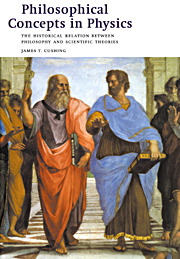 Philosophical Concepts in Physics
Philosophical Concepts in Physics Book contents
- Frontmatter
- Contents
- Preface
- Copyright acknowledgments
- PART I The scientific enterprise
- PART II Ancient and modern models of the universe
- PART III The Newtonian universe
- PART IV A perspective
- PART V Mechanical versus electrodynamical world views
- PART VI The theory of relativity
- PART VII The quantum world and the completeness of quantum mechanics
- PART VIII Some philosophical lessons from quantum mechanics
- 22 The EPR paper and Bell's theorem
- 23 An alternative version of quantum mechanics
- 24 An essential role for historical contingency?
- PART IX A retrospective
- Notes
- General references
- Bibliography
- Author index
- Subject index
24 - An essential role for historical contingency?
Published online by Cambridge University Press: 05 June 2012
- Frontmatter
- Contents
- Preface
- Copyright acknowledgments
- PART I The scientific enterprise
- PART II Ancient and modern models of the universe
- PART III The Newtonian universe
- PART IV A perspective
- PART V Mechanical versus electrodynamical world views
- PART VI The theory of relativity
- PART VII The quantum world and the completeness of quantum mechanics
- PART VIII Some philosophical lessons from quantum mechanics
- 22 The EPR paper and Bell's theorem
- 23 An alternative version of quantum mechanics
- 24 An essential role for historical contingency?
- PART IX A retrospective
- Notes
- General references
- Bibliography
- Author index
- Subject index
Summary
In previous chapters we argued that the empirically successful formalism of quantum mechanics supports equally well two mutually incompatible general ontologies: the inherently indeterministic and generally accepted Copenhagen interpretation and Bohm's completely deterministic one. This underdetermination of the interpretation by the formalism is not simply an apparent one of two equivalent theories since there is no way to translate the terms of one of these ontologies into those of the other. This case could be seen as presenting a challenge to the scientific realist who seeks from successful scientific theories a true representation of the world. Furthermore, we suggest that the actual historical competition between these theories and the selection of Copenhagen over Bohm illustrate that such an historically contingent process is not meaningfully distinct from the rational reconstruction and logical judgment of the victorious theory. What is deemed successful and put on offer by the scientific community for the philosopher of science to justify after the fact is itself a contingent and nonunique product.
UNDERDETERMINATION
The origin of the underdetermination of scientific theories, what we refer to here as the so-called Duhem–Quine thesis, is typically located in Pierre Duhem's The Aim and Structure of Physical Theory (first published in 1906). There Duhem was quite explicit about what he took to be the basis for judging whether or not a given physical theory is acceptable.
- Type
- Chapter
- Information
- Philosophical Concepts in PhysicsThe Historical Relation between Philosophy and Scientific Theories, pp. 345 - 356Publisher: Cambridge University PressPrint publication year: 1998


